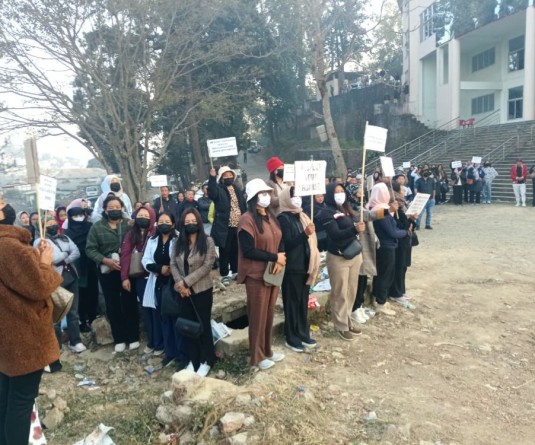
CM on post COVID-19 economic recovery
Our Correspondent
Kohima | August 5
Chief Minister (CM) Neiphiu Rio today said that the COVID-19 pandemic has been highly disruptive and challenging, and has impacted the people in many ways.
“We have to, however, look beyond the COVID-19 pandemic, to a future with high rates of sustained economic growth and better income levels for our citizens,” the CM said while adding that, at the same time, saving lives should continue to be the main focus.
“We have to continue moving forward with twin main focus – saving livelihoods as well as lives, till the time the pandemic is behind us,” said Rio in his concluding remarks during discussion on post COVID-19 economic recovery at the NLA session on August 5 which was initiated by Minister for Planning & Coordination, Land Revenue and Parliamentary Affairs Neiba Kronu.
Negative economic growth anticipated
With lockdowns and restrictions causing a sharp impact on economic activities at the global and national level, the CM said that the State has also not been spared.
“From 7.43 percent growth during 2019-20, the State’s economy is anticipated to register a negative growth of -5.59 percent (Advanced Estimate) during 2020-21. During same period (i.e. 2020-21) the Indian economy is estimated to register a negative growth rate of -7.3 percent. In absolute terms, the contraction in the State economy is anticipated to the tune of Rs 1013.11 crore during 2020-21, Rio said.
Strategic Committee for Economic Affairs for Nagaland
Rio said post the first wave of COVID-19, in order to revive the economy and to bring about self sufficiency specially in the Agri and allied sectors and to provide livelihood options to the people adversely affected by the pandemic, a Strategic Committee for Economic Affairs for Nagaland was constituted which asked a Core Group to work out strategies and action plan for strengthening the State’s economy.
The strategy focused on strengthening of Agri and allied sector, skills and service sector and trade and commerce. The strategic road map with four key objectives namely self reliance, re-skilling, gainful employment and facilitation was developed with short term and long term goals.
During the financial year 2020-21, proposal entitled ‘Road Map for Economic Development of Nagaland Post COVID lockdown’ comprising 23 projects amounting to Rs 8062.64 lakh was submitted to NEC.
Out of these, NEC has approved 12 projects worth Rs 3117 lakh. NEC has sanctioned all the projects and also released a total of Rs 764 lakh as first installment, he informed.
During the second wave of COVID-19 in April 2021, the State was again faced with the challenge of balancing between keeping the economy going while at the same time shutting it down to protect the citizens. A conscious effort has been made that as far as possible the economic activity should not suffer, Rio said.
Stating that agriculture and allied activities continue to be the main source of livelihood for the rural people of the State, the CM said, “Therefore, while we imposed restrictions, agriculture and allied activities and construction related activities have been allowed to continue even during the peak of the pandemic of the second wave, with adequate safeguards.”
He said ten departments namely Agriculture, Horticulture, AH &Vety service, Fisheries, Land Resources, Forests, Industries, RD, Employment, Labour and Urban have implemented projects worth Rs 8224.15 lakh for various activities, funding for which includes Centrally Sponsored Schemes, NEC and State resources including Negotiated Loan.
The Rural Development Department (NSRLM) has reportedly spent Rs 2940.62 lakh as the highest expenditure incurred followed by Agriculture with Rs 2278.52 lakh and Fisheries with Rs 1084.59 lakh etc. While doing so, 46,263 beneficiaries have been benefitted, the CM informed.
Many schemes have covered all 74 blocks covering all 12 districts and more than 10,000 household have been covered under NSLRM. About 1000 villages have been covered, especially through Horticulture and RD activities, it was informed.
Under Industries and Commerce, about 500 youth/artisans are to be trained annually under Common Facility Centres in 6 cane, bamboo and wood based handicraft clusters. Under Employment, Skill Development and Entrepreneurship department through convergence with Agriculture department and NSRLM implemented NEC scheme, more than 1100 youths have benefitted.
With a view avoid supply-chain and logistical disruptions by integrating with national and global supply chains, and allow agricultural producers to fetch a higher value for their produce, Air Cargo services have been started with effect from March 2, 2021, Rio said.
A total of 1293 loans at Rs 10,000 per person have been sanctioned under the PM Street Vendor’s Atma Nirbhar Nidhi Scheme.
‘Mobile Skill Morung’, a fully equipped training workshop on wheels was launched to travel across the State to impart trainings in various job roles. During the coming months, training and basic hand tools will also be provided to the rural youth as per demand for skills in the construction and agriculture sector, etc. in skills like electrician, carpentry, masonry, plumbing and mushroom growing, Rio added.
Similarly, among many other departments, a review of seven departments- Agriculture, Horticulture, Fisheries, Land Resources, RD, Industries and Labour has been undertaken and it is anticipated that these departments will spend an amount of Rs 219.85 crore in the next 8 months, he stated.
Hornbill festival
Stating that the travel and hospitality industry all over the world has been badly bruised by the pandemic, Rio said, “We are no exception. Hopefully, we shall be having the Hornbill festival this year, which would reinvigorate the sector.”
“None of us have definite answers whether there are going to be any future COVID surges. Vaccine acceptance is increasing, and in Nagaland also 50% of our eligible population has received at least one dose of vaccine and hopefully we will be able to increase it substantially. We have to be, however, prepared in all respects for any future COVID surges. We should, therefore, continue investing in our healthcare infrastructure and human resources. We have improved our testing capacity, oxygen bed and ICU bed capacity and plan to further strengthen ICUs, hospital beds and other infrastructure during the coming year. This will have the twin impacts of being ready for any future pandemic as well as helping the economy grow,” he said.
With the interventions already taken by the government, creating the infrastructure and harnessing the skills of the people and resources, the CM expressed hope for a sustained economic growth of more than 10% per annum during the remaining part of the year as well as the coming year.






